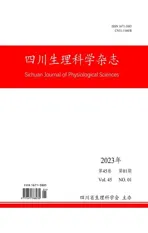An E3 ligase network engages GCN1 to promote the degradation of translation factors on stalled ribosomes
2023-03-22KeelyOltionetal
Keely Oltion, et al.
Ribosomes frequently stall during mRNA translation, resulting in the context-dependent activation of quality control pathways to maintain proteostasis. However, surveillance mechanisms that specifically respond to stalled ribosomes with an occluded A site have not been identified. We discovered that the elongation factor-1α (eEF1A) inhibitor, ternatin-4, triggers the ubiquitination and degradation of eEF1A on stalled ribosomes. Using a chemical genetic approach, we unveiled a signaling network comprising two E3 ligases, RNF14 and RNF25, which are required for eEF1A degradation. Quantitative proteomics revealed the RNF14 and RNF25-dependent ubiquitination of eEF1A and a discrete set of ribosomal proteins. The ribosome collision sensor GCN1 plays an essential role by engaging RNF14, which directly ubiquitinates eEF1A. The site-specific, RNF25-dependent ubiquitination of the ribosomal protein RPS27A/eS31 provides a second essential signaling input. Our findings illuminate a ubiquitin signaling network that monitors the ribosomal A site and promotes the degradation of stalled translation factors, including eEF1A and the termination factor eRF1.
杂志排行
四川生理科学杂志的其它文章
- An atlas of substrate specificities for the human serine/threonine kinome
- Acute aortic dissection
- Immunity to the microbiota promotes sensory neuron regeneration
- Futibatinib for FGFR2-Rearranged Intrahepatic Cholangiocarcinoma
- Mono- and biallelic variant effects on disease at biobank scale
- The person-to-person transmission landscape of the gut and oral microbiomes
